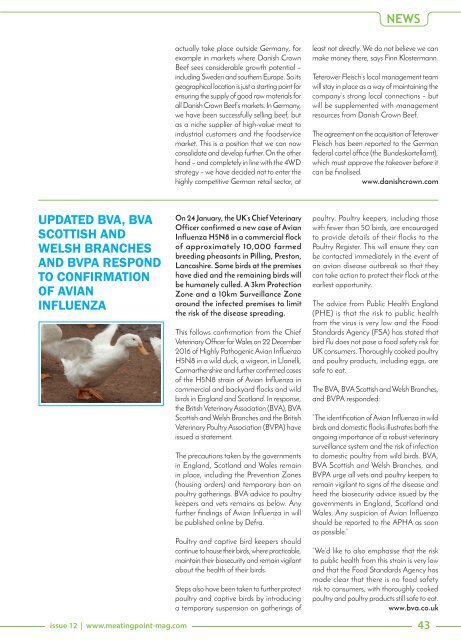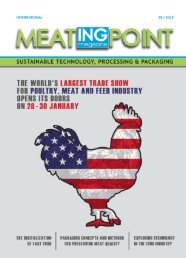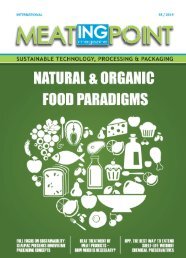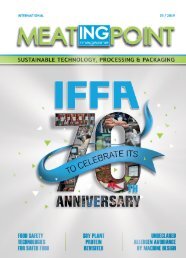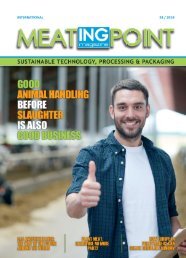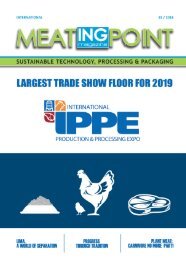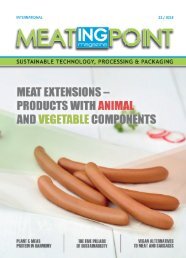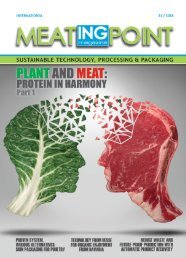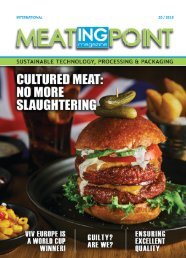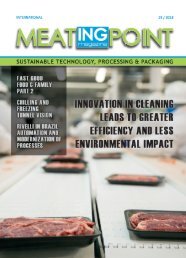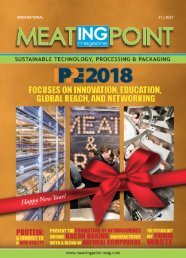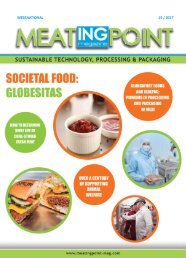MEATing POINT Magazine: #12 / 2017
Create successful ePaper yourself
Turn your PDF publications into a flip-book with our unique Google optimized e-Paper software.
NEWS<br />
actually take place outside Germany, for<br />
example in markets where Danish Crown<br />
Beef sees considerable growth potential –<br />
including Sweden and southern Europe. So its<br />
geographical location is just a starting point for<br />
ensuring the supply of good raw materials for<br />
all Danish Crown Beef’s markets. In Germany,<br />
we have been successfully selling beef, but<br />
as a niche supplier of high-value meat to<br />
industrial customers and the foodservice<br />
market. This is a position that we can now<br />
consolidate and develop further. On the other<br />
hand – and completely in line with the 4WD<br />
strategy – we have decided not to enter the<br />
highly competitive German retail sector, at<br />
least not directly. We do not believe we can<br />
make money there, says Finn Klostermann.<br />
Teterower Fleisch’s local management team<br />
will stay in place as a way of maintaining the<br />
company’s strong local connections – but<br />
will be supplemented with management<br />
resources from Danish Crown Beef.<br />
The agreement on the acquisition of Teterower<br />
Fleisch has been reported to the German<br />
federal cartel office (the Bundeskartellamt),<br />
which must approve the takeover before it<br />
can be finalised.<br />
www.danishcrown.com<br />
UPDATED BVA, BVA<br />
SCOTTISH AND<br />
WELSH BRANCHES<br />
AND BVPA RESPOND<br />
TO CONFIRMATION<br />
OF AVIAN<br />
INFLUENZA<br />
issue 12 | www.meatingpoint-mag.com<br />
On 24 January, the UK’s Chief Veterinary<br />
Officer confirmed a new case of Avian<br />
Influenza H5N8 in a commercial flock<br />
of approximately 10,000 farmed<br />
breeding pheasants in Pilling, Preston,<br />
Lancashire. Some birds at the premises<br />
have died and the remaining birds will<br />
be humanely culled. A 3km Protection<br />
Zone and a 10km Surveillance Zone<br />
around the infected premises to limit<br />
the risk of the disease spreading.<br />
This follows confirmation from the Chief<br />
Veterinary Officer for Wales on 22 December<br />
2016 of Highly Pathogenic Avian Influenza<br />
H5N8 in a wild duck, a wigeon, in Llanelli,<br />
Carmarthenshire and further confirmed cases<br />
of the H5N8 strain of Avian Influenza in<br />
commercial and backyard flocks and wild<br />
birds in England and Scotland. In response,<br />
the British Veterinary Association (BVA), BVA<br />
Scottish and Welsh Branches and the British<br />
Veterinary Poultry Association (BVPA) have<br />
issued a statement.<br />
The precautions taken by the governments<br />
in England, Scotland and Wales remain<br />
in place, including the Prevention Zones<br />
(housing orders) and temporary ban on<br />
poultry gatherings. BVA advice to poultry<br />
keepers and vets remains as below. Any<br />
further findings of Avian Influenza in will<br />
be published online by Defra.<br />
Poultry and captive bird keepers should<br />
continue to house their birds, where practicable,<br />
maintain their biosecurity and remain vigilant<br />
about the health of their birds.<br />
Steps also have been taken to further protect<br />
poultry and captive birds by introducing<br />
a temporary suspension on gatherings of<br />
poultry. Poultry keepers, including those<br />
with fewer than 50 birds, are encouraged<br />
to provide details of their flocks to the<br />
Poultry Register. This will ensure they can<br />
be contacted immediately in the event of<br />
an avian disease outbreak so that they<br />
can take action to protect their flock at the<br />
earliest opportunity.<br />
The advice from Public Health England<br />
(PHE) is that the risk to public health<br />
from the virus is very low and the Food<br />
Standards Agency (FSA) has stated that<br />
bird flu does not pose a food safety risk for<br />
UK consumers. Thoroughly cooked poultry<br />
and poultry products, including eggs, are<br />
safe to eat.<br />
The BVA, BVA Scottish and Welsh Branches,<br />
and BVPA responded:<br />
“The identification of Avian Influenza in wild<br />
birds and domestic flocks illustrates both the<br />
ongoing importance of a robust veterinary<br />
surveillance system and the risk of infection<br />
to domestic poultry from wild birds. BVA,<br />
BVA Scottish and Welsh Branches, and<br />
BVPA urge all vets and poultry keepers to<br />
remain vigilant to signs of the disease and<br />
heed the biosecurity advice issued by the<br />
governments in England, Scotland and<br />
Wales. Any suspicion of Avian Influenza<br />
should be reported to the APHA as soon<br />
as possible.”<br />
“We’d like to also emphasise that the risk<br />
to public health from this strain is very low<br />
and that the Food Standards Agency has<br />
made clear that there is no food safety<br />
risk to consumers, with thoroughly cooked<br />
poultry and poultry products still safe to eat.<br />
www.bva.co.uk<br />
43


